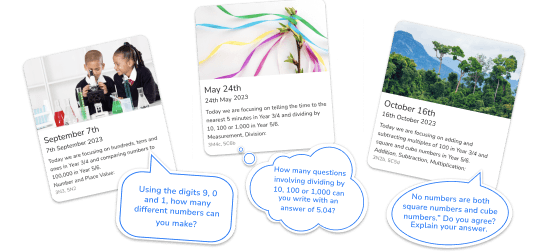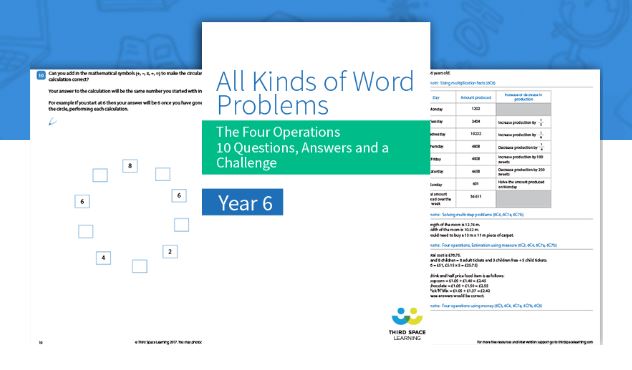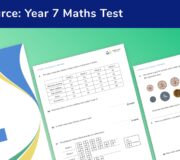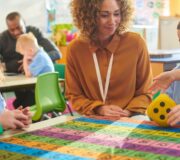20 Word Problems For Year 6: Develop Their Problem Solving Skills Across Single and Mixed KS2 Topics
Word problems for Year 6 are an important part of the curriculum. For children to achieve success in the Year 6 SATs, in particular the more challenging reasoning element of the SATs assessments, it is essential they have the confidence to tackle a wide range of word problems.
Key to this success is regular exposure to the style and type of questions, covering the topics children could be presented with. Our collection of year 6 maths worksheets are is a great place to start.
To help child practice their problem solving skills, we have put together a collection of 20 word problems, organised by topic. This collection encompasses the types of questions children may encounter in the two reasoning papers.
All Kinds of Word Problems Four Operations
Download this free pack of word problems. With questions covering all four operations, your students will have a great opportunity to practice their problem solving skills across KS2 topics.
Download Free Now!- Year 6 Maths Word Problems in the National Curriculum
- Why are word problems important in Year 6 maths?
- How to teach problem solving in Year 6
- Word problems in SATS
- Addition word problems for Year 6
- Subtraction word problems for Year 6
- Multiplication word problems for year 6
- Division word problems for Year 6
- Fractions, decimals and percentage word problems for Year 6
- Ratio word problems for Year 6
- Mixed four operation word problems for Year 6
- More word problems resources
Year 6 Maths Word Problems in the National Curriculum
The National Curriculum states that children need to be able to solve problems by applying their mathematics to a variety of routine and non-routine problems with increasing sophistication, including breaking down problems into simpler steps and persevering in seeking solutions.
By Year 6, children can expect to be tackling a range of one-step, two-step and multi-step word problems. To achieve at least the expected standard in Year 6, pupils need to demonstrate the ability to solve word problems across a range of topics.
Place value
Solving problems including ordering, rounding and negative numbers.
Addition, subtraction, multiplication and division
Solving multiplication, division and addition and subtraction word problems including one and two-step word problems and multi-step word problems in context, deciding which operations and methods to use and why.
Fractions
Solving problems involving comparing, ordering and sequencing fractions; using the four operations and problems which require answers to be rounded to specified degrees of accuracy.
Ratio and proportion
Solving problems involving the relative sizes of two quantities; the calculation of percentages; involving similar shapes where the scale factor is known and can be found; and unequal sharing and grouping, using knowledge of fractions and multiples.
Measures
Solving problems including time word problems and involving the calculation and conversion of units of measure, using decimal notation up to three decimal places, where appropriate.
Statistics
Interpret and construct pie and line graphs and use these to solve problems.
Why are word problems important in Year 6 maths?
Word problems are an essential element of the Year 6 curriculum, because they require children to apply the knowledge they have learnt to ‘real life’ situations, for example, in money word problems. They shouldn’t just be taught as stand alone topics, but should be incorporated in lessons throughout the year, to ensure children have as much exposure as possible.
Solving word problems helps children learn the skills needed to apply their knowledge of maths beyond the classroom and into the real world.
How to teach problem solving in Year 6
When teaching problem solving in Year 6, children need to firstly look carefully at the key information and think about what they already know. Secondly, what is the word problem actually asking? Which calculation(s) would be required and would it help to draw/represent the problem pictorially?
Here is an example:
Ahmed is buying clothes. He buys a t-shirt for £12.99 and a pair of jeans which cost £12.26 more than the T-shirt. He pays with a £50 note. What change does Ahmed get?
How to solve:
What do you already know?
- More than means I will need to add the price of the T-shirt and jeans together.
- Decimals numbers means I need to remember to line up the decimal points in my calculations.
- Calculating change means I will need to subtract the total for the jeans and T-shirt from the original amount.
How can this be drawn/represented pictorially?
We can draw a bar model to represent this problem:

- To calculate the cost of the jeans, we need to add £12.99 and £12.26 = £25.25
- Ahmed pays using a £50 note.
- To calculate the change Ahmed will get, we need to subtract £25.25 from £50.
- £50 – £25.25 = £24.75
Word problems in SATS
Problem solving is an important part of the preparation for the Key Stage 2 SATs, as this is the area children tend to find the most challenging. With two reasoning papers to complete, children will be expected to answer a wide range of word and number problem style questions. The best preparation for this is through regular exposure to these types of questions.
Addition word problems for Year 6
Addition word problems at Year 6 include larger 6 or 7 digit numbers, decimal numbers and problems involving finding the inverse. These can be one, two and multi-step problems
Addition question 1
A shopping centre had 124,713 visitors in January, 102,539 in February and 118,768 in March. How many shoppers visited the shopping centre from January to March?
Answer (1 mark): 346,020
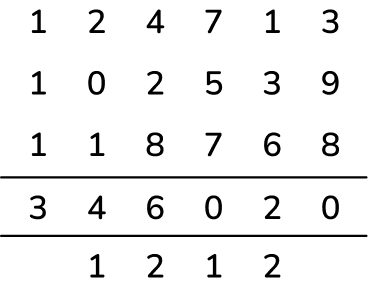
Addition question 2
A shop has an offer on all T-shirts.
Buy one T-shirt, get one for half price.
If Tom buys 2 T-shirts, how much does he pay altogether?
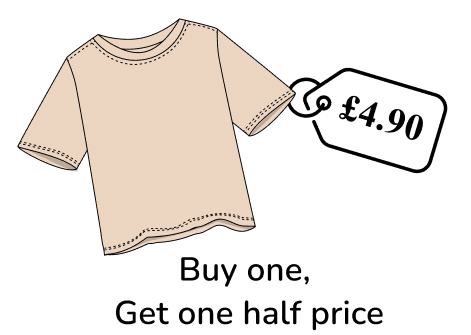
Answer (2 marks): £7.35
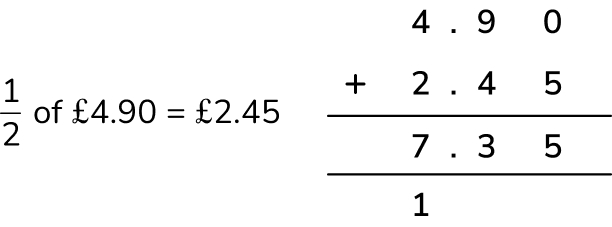
Addition question 3
The table below shows the number of visitors to the planetarium and the transport museum each day. Which day had the most visitors?

Answer (2 marks): Saturday
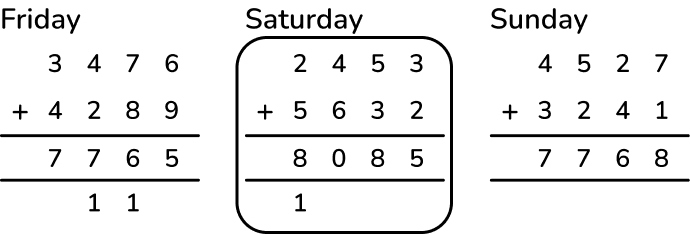
Subtraction word problems for Year 6
Subtraction word problems in Year 6 include larger 6 or 7 digit numbers, decimal numbers and problems involving finding the inverse. These can be one, two and multi-step problems
Subtraction question 1
In the Autumn term, the total number of English and maths worksheets printed by a school was 63,502. 39,756 were maths worksheets. How many worksheets were printed out for English?
Answer (1 mark): 23,746
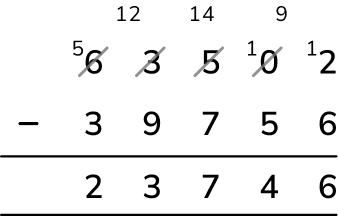
Subtraction question 2
6 cars were weighed before being loaded onto the car transporter.
They weight of the cars was:
- 1425kg
- 1262kg
- 2218kg
- 1568kg
- 2305kg
- 1656kg.
What is the difference in weight between the heaviest and lightest car?
Answer (1 mark): 1043kg
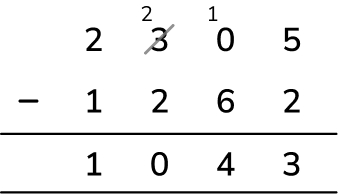
Subtraction question 3
Two decimal numbers add together to make 37.53.
One number is 23.86.
What is the other number?
Answer (1 mark): 13.67
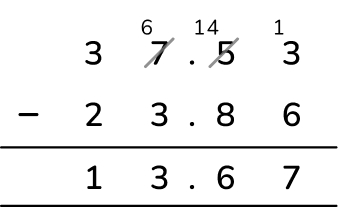
Multiplication word problems for year 6
Multiplication word problems can include multiplying whole and decimal numbers by 1 and 2-digit numbers. A secure knowledge of times tables is helpful for children solving these questions confidently.
Multiplication question 1
A box of chocolate contains 2 trays of chocolates.
There are 18 chocolates on each tray.
How many chocolates are there in 35 boxes of chocolates?
Answer (2 marks): 1260
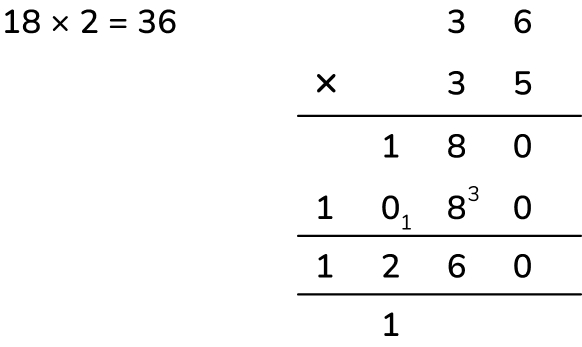
Multiplication question 2
Zara buys 4 large boxes of cupcakes and 3 small boxes of cupcakes.
Each large box contains 28 cupcakes. Each small box contains 16 cupcakes.
How many cupcakes does Zara buy altogether?
Answer (2 marks): 160

Multiplication question 3
A cyclist cycled a route of 123.6 miles once a week for a year. How far did he cycle over the whole year?
Answer (2 marks): 6427.2
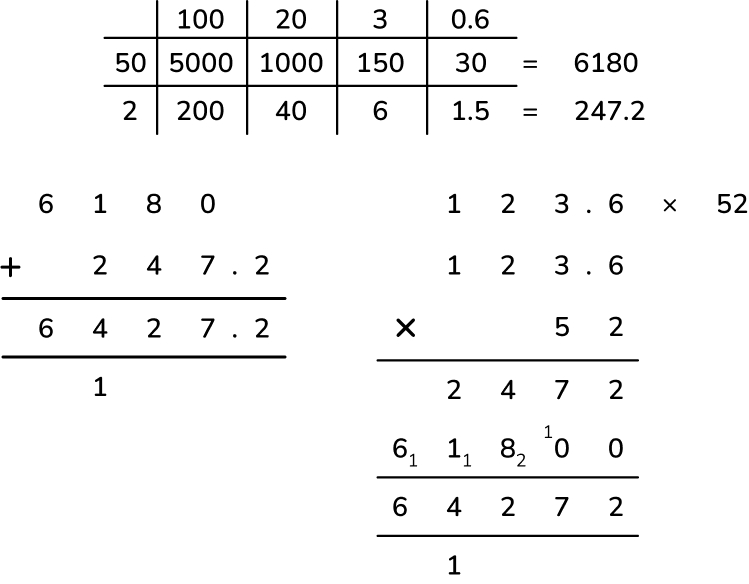
Division word problems for Year 6
Division word problems in Year 6 can include division with whole numbers and decimal numbers, dividing by 1 and 2-digit numbers.
Division question 1
A 940ml bottle of blackcurrant makes 20 drinks.
How many millilitres of blackcurrant are in each drink?
Answer (2 marks): 47
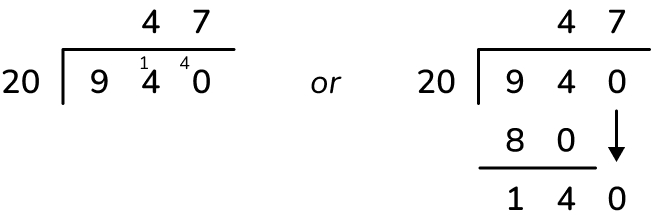
Division question 2
Mr Jones is organising mini buses for a Year 6 school trip. Each minibus seats 12 people
120 Year 6 pupils are going on a school trip.
There needs to be one adult for every 10 pupils
How many coaches will Mr Jones need to book?
Answer (2 marks): 12 mini buses
125 pupils will need 13 adults = 138 in total

Division question 3
A factory is packaging eggs in boxes of 12.
The factory has 878 eggs to box-up.
How many boxes will they have, to send to the supermarket?
Answer (2 marks): 73 boxes
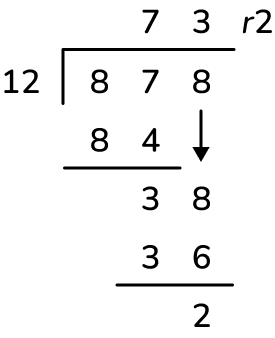
Fractions, decimals and percentage word problems for Year 6
Decimals, percentage word problems and fraction word problems can be stand alone, or they can involve converting between. For example, in questions using measures.
Fractions, decimals and percentages question 1
By the end of the Autumn term, Chloe had used ⅔ of her maths book. If the book had 96 pages, how many pages had she used?
Answer (1 mark): 64 pages
⅓ of 96 = 32
⅔ of 96 = 64
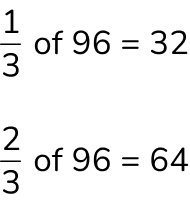
Fractions, decimals and percentages question 2
Abdullah received £600 for his birthday. He spent 45% of him money on a VR headset. How much did the headset cost him?
Answer (1 mark): £270
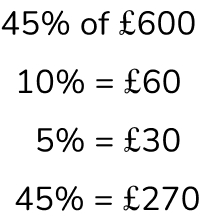
Fractions, decimals and percentages question 3
Mrs Jones went to the local supermarket to buy some vegetables.
She bought:
- 1 3/10kg of potatoes
- 840.5g of apples
- 4/5kg of peaches
- 520.6g of grapes
What was the total weight of the shopping Mrs Jones bought?
Answer (1 mark):
- 1.3kg potatoes
- 0.8405kg apples
- 0.8kg peaches
- 0.520kg grapes
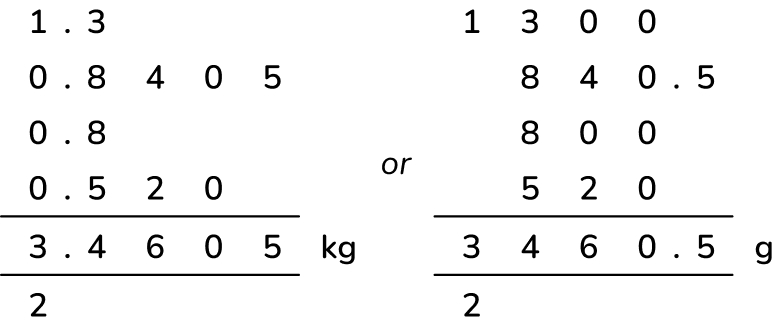
Ratio word problems for Year 6
Ratio word problems are often linked with measures. Children should be encouraged to draw bar models to solve problems involving ratio, as these question really benefit from a visual representation.
Ratio question 1
Sam and Zeyn were making drinks for the school fair. To make the jugs of squash, they were mixing 300ml of orange squash with 1500ml of water.
If they have 900ml of orange squash
- How much water will they need altogether?
- What will be the total volume of the squash?
Answer (2 marks):
- 4500ml of water
- 5400ml of squash
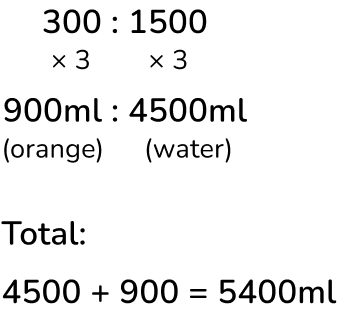
Ratio question 2
A piece of ribbon is 72cm long. It is cut into pieces in the ratio of 2:3:4.
How long is each piece of ribbon?
Answer (1 mark): 16cm:24cm:32cm
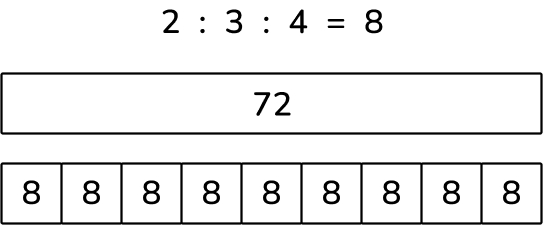
2+3+4=9
72➗9 = 8
2=16
3=24
4=32
Mixed four operation word problems for Year 6
Mixed operation word problems require two or more operations to solve. Alongside the four operations, they can also include other topics, including fractions and percentages These can be two-step or multi-step questions and are worth 2 or 3 marks in SATs papers.
Third Space Learning’s online one-to-one tutoring programmes include questions that combine skills students have learnt and test their understanding across a range of topics. Personalised to the needs of each individual student, our online tutoring programme works to identify gaps in learning, fill those gaps and reinforce students’ maths knowledge.
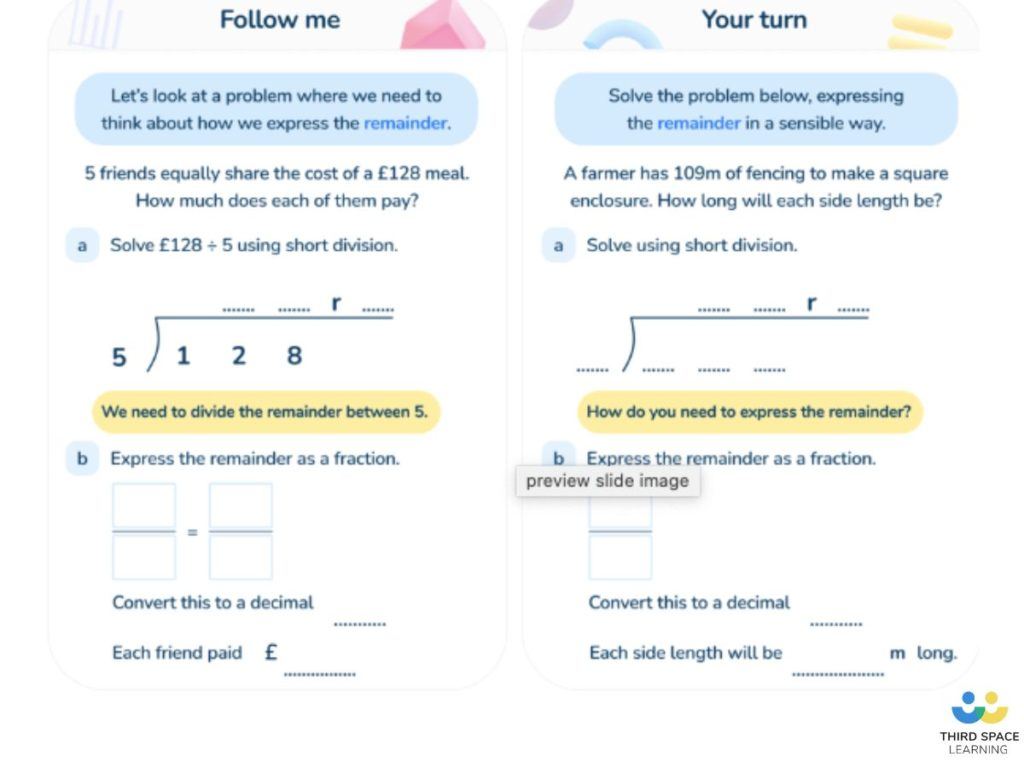
online one-to-one Year 6 maths programme
Mixed four operations question 1
One bank-holiday weekend, a total of 346,728 people visited a theme park.
134,235 visited on Saturday
121,689 visited on Sunday.
How many visited on bank holiday Monday?
Answer (2 marks): 90,804

Mixed four operations question 2
A pair of jeans in a shop cost £28.
In the sale, they were reduced in price by 25%.
What was the reduced price?

Answer (2 marks): £21

Mixed four operations question 3
Sophie thinks of a number.
She multiplies her number by 6.
Then she adds 10
Finally she divides by 4.
Her answer is 13.
What was her original number?
Answer (1 mark): 7
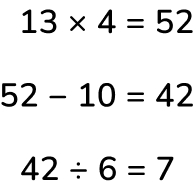
More word problems resources
Third Space Learning also offers a wide array of maths and word problems resources for other year groups such as word problems for Year 5, word problems for Year 4 and word problems for Year 3
DO YOU HAVE STUDENTS WHO NEED MORE SUPPORT IN MATHS?
Every week Third Space Learning’s specialist primary maths tutors support thousands of students across hundreds of schools with weekly online 1 to 1 maths lessons designed to plug gaps and boost progress.
Since 2013 these personalised one to one lessons have helped over 150,000 primary and secondary students become more confident, able mathematicians.
Learn how tutors develop pupils’ maths fluency or request a personalised quote for your school to speak to us about your school’s needs and how we can help.
